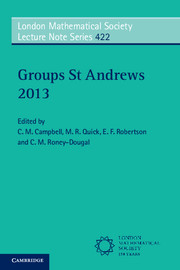Book contents
- Frontmatter
- Contents
- INTRODUCTION
- Approximate subgroups and super-strong approximation
- Width questions for finite simple groups
- Profinite properties of discrete groups
- GL(n, Z), Out(Fn) and everything in between: automorphism groups of RAAGs
- Permutation groups and transformation semigroups: results and problems
- New progress on factorized groups and subgroup permutability
- A survey on the normalizer problem for integral group rings
- A survey on Clifford-Fischer theory
- A generalisation on the solvability of finite groups with three class sizes for normal subgroups
- Automorphism groups of non-orientable Riemann surfaces
- What are the C2-groups?
- Resurrecting Wells’ exact sequence and Buckley's group action
- Recent work on Beauville surfaces, structures and groups
- Something for nothing: some consequences of the solution of the Tarski problems
- The groups of projectivities in finite planes
- On the relation gap and relation lifting problem
- Some results on products of finite subsets in groups
- Formal languages and group theory
- On the Castelnuovo-Mumford regularity of the cohomology of fusion systems and of the Hochschild cohomology of block algebras
- Recent advances on torsion subgroups of integral group rings
- On finite groups with small prime spectrum
- Solvability criteria for finite loops and groups
- The rational subset membership problem for groups: a survey
- A survey of Milnor laws
- Capable p-groups
- On the normal structure of a finite group with restrictions on the maximal subgroups
- Certain monomial characters and their normal constituents
- Recognition of finite quasi-simple groups by the degrees of their irreducible representations
- Generalized Baumslag-Solitar groups: a survey of recent progress
- Zeta functions of groups and rings – recent developments
Certain monomial characters and their normal constituents
Published online by Cambridge University Press: 05 September 2015
- Frontmatter
- Contents
- INTRODUCTION
- Approximate subgroups and super-strong approximation
- Width questions for finite simple groups
- Profinite properties of discrete groups
- GL(n, Z), Out(Fn) and everything in between: automorphism groups of RAAGs
- Permutation groups and transformation semigroups: results and problems
- New progress on factorized groups and subgroup permutability
- A survey on the normalizer problem for integral group rings
- A survey on Clifford-Fischer theory
- A generalisation on the solvability of finite groups with three class sizes for normal subgroups
- Automorphism groups of non-orientable Riemann surfaces
- What are the C2-groups?
- Resurrecting Wells’ exact sequence and Buckley's group action
- Recent work on Beauville surfaces, structures and groups
- Something for nothing: some consequences of the solution of the Tarski problems
- The groups of projectivities in finite planes
- On the relation gap and relation lifting problem
- Some results on products of finite subsets in groups
- Formal languages and group theory
- On the Castelnuovo-Mumford regularity of the cohomology of fusion systems and of the Hochschild cohomology of block algebras
- Recent advances on torsion subgroups of integral group rings
- On finite groups with small prime spectrum
- Solvability criteria for finite loops and groups
- The rational subset membership problem for groups: a survey
- A survey of Milnor laws
- Capable p-groups
- On the normal structure of a finite group with restrictions on the maximal subgroups
- Certain monomial characters and their normal constituents
- Recognition of finite quasi-simple groups by the degrees of their irreducible representations
- Generalized Baumslag-Solitar groups: a survey of recent progress
- Zeta functions of groups and rings – recent developments
Summary
Abstract
Suppose that G is a finite p-solvable group such that NG(P)/P has odd order, where P ∈ Sylp(G). If χ is an irreducible complex character with degree not divisible by p and field of values contained in a cyclotomic field Qpa, then every subnormal constituent of χ is monomial. Also, the number of such irreducible characters is the number of NG(P)-orbits on P/P’.
Introduction
There are few results guaranteeing that a single irreducible complex character χ ∈ Irr(G) of a finite group G is monomial. Recall that χ ∈ Irr(G) is monomial if there is ƛ ∈ Irr(U) linear such that ƛG = χ. It is known that every irreducible character of a supersolvable group is monomial, for instance, but this result depends more on the structure of the group rather than on the properties of the characters themselves. An exception is a theorem by R. Gow of 1975 ([3]): an odd degree real valued irreducible character of a solvable group is monomial. Recently, we gave in [8] an extension of this theorem which also dealt with the degree and the field of values of the character. (Yet another similar monomiality criterium was given in [9]: if the field of values Q(χ) of χ is contained in the cyclotomic field Qn and (χ(1), 2n) = 1, then χ is monomial whenever G is solvable.) In this note, we apply non-trivial Isaacs π-theory of solvable groups to give a shorter proof of the above result at the same time that we gain some new information about the subnormal constituents of the characters, among other things. It does not seem easy at all to prove these new facts without using this deep theory.
Recall that for every solvable group and any set of primes π, M. Isaacs defined a canonical subset Bπ(G) of Irr(G) with remarkable properties ([4]). Since, by definition, every χ ∈ Bπ(G) is induced from a character of π-degree, it is clear that Bπ-characters of π’-degree are monomial.
- Type
- Chapter
- Information
- Groups St Andrews 2013 , pp. 436 - 438Publisher: Cambridge University PressPrint publication year: 2015



